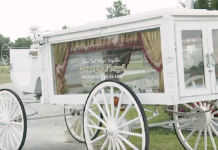
ATLANTA (GA Recorder) — Georgia Public Health Commissioner Dr. Kathleen Toomey shared a frank and disturbing snapshot of the spread of COVID-19 in the state Monday.
“We are, as I’ve mentioned before, a little behind some of our other southern states where we are with the delta surge, and this is indeed a delta surge,” she told reporters at the Capitol. “Virtually 100% of all our cases are delta variant, and we’re now approaching among the worst cases, both in case numbers and hospitalizations that we’ve had since January, in some cases, actually worse in some parts of the state than we were in January. Saturday, we had 12,223 total cases reported, which was one of our highest daily case rates ever reported. And all 159 of our counties are at a high transmission level. So all these areas are considered in the red zone.”
According to her department, 43% of Georgians are fully vaccinated, compared with 52.5% for the nation, according to the Mayo Clinic.
The recent surge in cases coincides with the return to class for many Georgia students, and cases have quadrupled among school-aged children, Toomey said, with the sharpest increase among 11 to 17-year-olds.
The COVID-19 symptoms are typically less severe among young people, but they can sometimes become seriously ill, and they can spread the disease to others.
“What’s happening, I think, is children are getting infected, and it’s being transmitted to others among the family members, so children can transmit the virus, and they are becoming affected,” Toomey said. “And fortunately, not as many are becoming hospitalized. We’ve seen, however, the highest number of weekly outbreaks since the pandemic began, 170 outbreaks statewide, with more than half of these outbreaks in K-12 schools. So the schools are a site where there is COVID transmission going on, and we’re working hard with the superintendents to try to address these issues in the schools.”
Bringing the public’s attention to those harsh facts was welcomed by Dr. Amber Schmidtke, a microbiologist who studies the spread of COVID-19 in Georgia.
“I’m pleased to know that the state is finally talking about that reality, and I’m hopeful that that might signal a change in leadership when it comes to talking about COVID, and how it spreads and the importance of layering those protective strategies in those high-risk environments,” she said.
Most of the hospitalized Georgians and nearly all of the recent deaths are among the unvaccinated, and vaccines will be the key to getting out of the crisis, said Toomey, adding that the state Department of Public Health has been expanding vaccination capacity across the state.
“We have the capacity to vaccinate more and more people, we just aren’t getting people coming to be vaccinated,” she said.
Calling in the National Guard
To help slow the rising tide of unvaccinated people washing up in crowded Georgia emergency departments, Gov. Brian Kemp announced plans to expand the presence of the Georgia National Guard in hospitals.
On Monday, Kemp signed an executive order allowing up to an additional 1,500 troops to be deployed to help out in mostly non-medical roles at hospitals. Including troops authorized by earlier executive orders, the National Guard may now deploy up to 2,500 servicemembers at the discretion of Adjutant General of the Georgia Department of Defense Thomas Carden.
The governor’s latest order also suspends regulations for commercial trucks, which he said will ensure hospitals have adequate supplies of oxygen to treat COVID-19 patients.
Kemp also announced new incentives for state employees to be vaccinated in the form of a $150 Visa gift card or a $480 credit that can be used for medical expenses. That’s on top of an offer last week of a day off Friday during which state workers are asked, but not required, to be vaccinated.
Also last week, Kemp pledged to spend $125 million to help hospitals hire 1,500 new staffers with dozens of them directed to rural hospitals, a process that is still underway.
“We’re literally working every day with every single vendor that we can find to hire every single person,” Kemp said. “And as soon as we are getting one of those folks, we’re sending them where they’re needed. Most certainly, our rural hospitals had a big need, but also our metro systems do as well. But we were never under the illusion that we were going to be able to hire 1,500 people in a week or two. It’s going to take us some time. But that is something we’re actively working on.”
Last week, the National Guard deployed 105 troops with medical training to 10 Georgia hospitals, followed by 75 regular soldiers to the same hospitals.
Service members with medical training are often unavailable because they are already fighting COVID-19 in their civilian jobs, Kemp said, but soldiers without health expertise can also be a big help.
“When I was talking to hospital CEOs the other day, I was like ‘What else do you need?’ And they started saying, you know, we can just help people, directing traffic, telling people ‘don’t come into the emergency room to get a test, you can go to the health department that’s two blocks away.’ You know, where do I park? Helping in cafeterias, cleaning, any of those jobs that they just need help with, turning rooms in hospitals, serving their clientele.”
The troops will be force multipliers by freeing up trained staff to perform the duties the soldiers cannot do, Kemp said.
“The other thing is, and I’ve heard this from the CEOs, it’s a real morale booster to let the people in the hospital know that are literally working 18-hour shifts that they appreciate the people who listen and they know how hard it is there right now, so I think it’s been a morale booster to those health care heroes as well,” he said.
Many health care workers could use a morale boost at the moment as cases approach record levels. Some have held news conferences pleading with Georgians to vaccinate, wear masks and socially distance as their hospitals surpass capacity.
And Toomey said some frontline health workers receiving vaccines have received threats, causing at least one mobile vaccination drive to shut down.
“I just said this is wrong. This is absolutely wrong,” Toomey said. “These people are giving their lives to help others, to help us in the state. We in Georgia can do better. We should be thanking these individuals who are trying to get life-saving vaccines to our state.”
Kemp also condemned the people behind the threatening messages Toomey said health workers have been receiving.
“I think this is a time for all Georgians to reflect back on the early days of the pandemic when people were delivering meals and donuts and other things to folks working in the hospitals and thanking their public health workers, and that’s what we should continue to do,” he said. “We need to unite in these tough times, not be divided, let’s all continue to work and be respectful in the days ahead.”
The news was saddening, but not surprising given the political climate, Schmidtke said.
“It’s really disappointing, and I wish that things were different,” she said. “Unfortunately, we have a situation where, for whatever reason, one of the political parties has made it part of their brand’s identity to deny the reality of this virus. And in many ways, they’ve sort of weaponized that among their followers against the health care community. And that’s very dangerous. What I would say to health care workers is that I’m hopeful that those people that are out there are the minority, but it’s going to become more important for health care facilities to think about security and making sure that their staff is protected.”
No mandates
Kemp has not gone as far in opposing mask or vaccine mandates as some other Republican governors — Iowa, Tennessee, South Carolina, Utah and Oklahoma are facing federal investigations into prohibitions against mask mandates in schools. Kemp has in recent weeks said he is content to let districts decide for themselves.
But Kemp continues to oppose other mandates, including in the University System of Georgia, casting doubts on whether they are effective in stopping the spread of the delta variant.
“This delta variant is spreading everywhere,” he said. “You can look at states, you can look at counties in the state. They have all kinds of different policies you can compare. Hawaii, who’s on perennial lockdown, to states in the south that are not doing that. The numbers aren’t any different, the trajectories aren’t any different. The same thing in a place like Missouri, which was the hottest state in the country for the longest period of time, many counties that had mandates, other counties that did not, the delta variant still spread.”
Many medical experts roundly reject that idea.
“I have not seen data to suggest that what the governor has said is true,” Schmidtke said. “I think it’s a convenient talking point, but it doesn’t have any basis in fact.”
Kemp said Georgia needs to stay focused on spreading the word about vaccines.
“Operation Warp Speed that was created in the Trump administration, in my opinion, is a medical miracle,” he said. “I’m glad I’m vaccinated. I’m glad my whole family’s vaccinated. I know that there are people out there that have vaccine hesitancy for a lot of different reasons.”
Kemp urged those vaccine-resisting Georgians to speak with a medical professional, faith leader or friend who had received the vaccine before making what he called “a medical decision that can possibly save your life.”
“We shouldn’t be fighting about this,” he said. “It’s just causing division. It’s causing people’s blood pressure to go up. We need to continue to educate and advocate for people getting the vaccine. And look, at the end of the day, there’s going to be people that don’t want to do that. And this is America. This is Georgia, and you can do that. But the fact is, you’re going to remain at risk of being in the hospital with COVID-19 and you run the risk of being on a ventilator, and you run the risk of being on a ventilator for two or three weeks and then dying. And that is a decision that everyone is going to have to make.”







